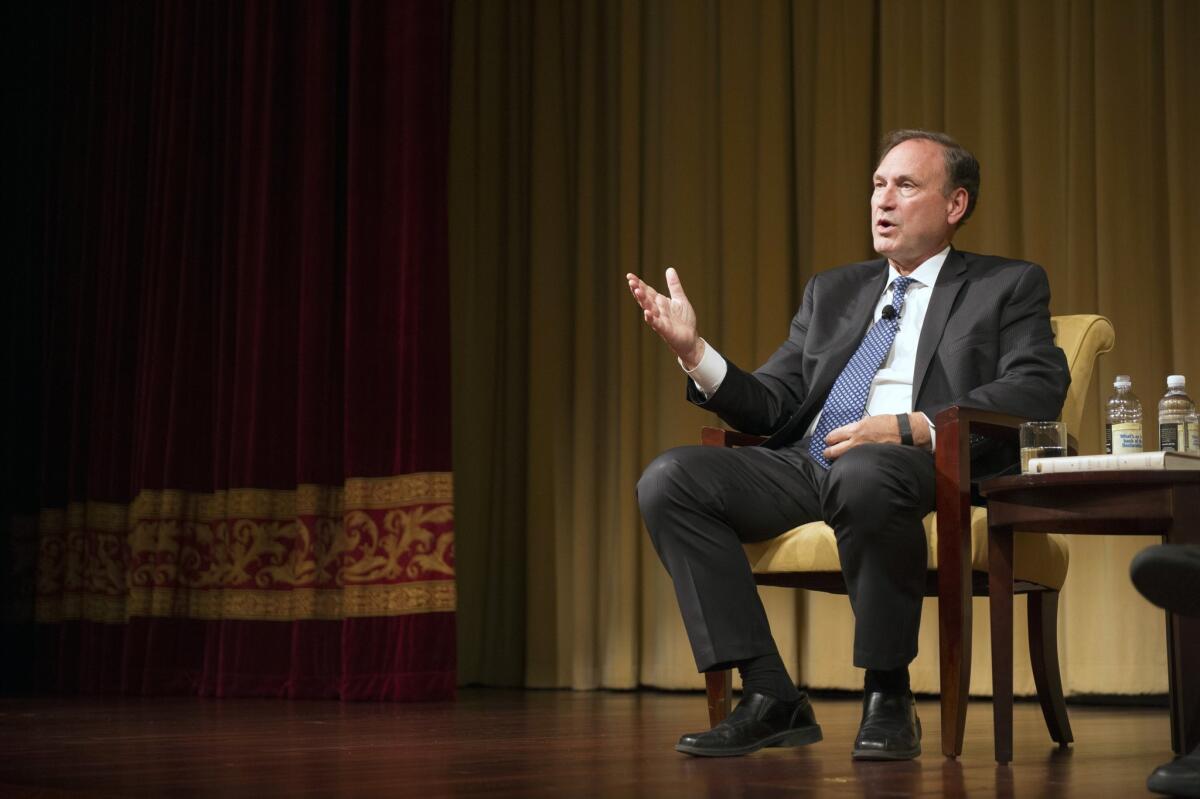Editorial: Supreme Court should reject this religious liberty argument

U.S. Supreme Court Associate Justice Samuel Alito gestures while participating in Conversation on the Constitution, an ongoing discussion series at the National Archives in Washington, D.C., on Oct. 29.
- Share via
In implementing the Affordable Care Act, the Obama administration has offered religious schools and charities that object to some birth control methods a reasonable and respectful accommodation: They need not provide or pay for contraceptive coverage for their female employees, but they must inform the government of their objections so coverage can be offered directly by an insurance company. But that compromise isn’t good enough for the leaders of some of the organizations, who believe that merely signing a paper expressing their objections makes them complicit in sin because it “triggers” actions by others.
Last week, the Supreme Court agreed to decide whether the organizations’ reluctance to cooperate even to that minimal extent is protected by the 1993 Religious Freedom Restoration Act, which bars the government from imposing a “substantial burden” on the exercise of religion unless doing so serves a compelling interest and is the least restrictive means of furthering that interest. It’s vital that the court reject the organizations’ extravagant interpretation of that law.
The ACA requires most employer health insurance plans to include coverage for preventive healthcare, a mandate that the Obama administration has interpreted to require that female employees be provided, without extra cost, all contraceptive methods recommended by the federal Preventive Services Task Force. The administration exempted houses of worship and religious orders from the mandate. But for religiously affiliated institutions, which employ people of many faiths and in some cases none at all, it crafted a compromise: Once an employer certified an objection to providing contraceptives, the cost would be assumed by its insurer or insurance administrator.
Ironically, in his majority opinion in last year’s Hobby Lobby case, Justice Samuel A. Alito Jr. praised that approach, noting that the government “has already devised and implemented a system that seeks to respect the religious liberty of religious nonprofit corporations while ensuring that the employees of these entities have precisely the same access to all FDA-approved contraceptives as employees of companies whose owners have no religious objections to providing such coverage.” But the new challengers are seizing on another passage in which Alito said that courts “have no business addressing” whether a religious belief is reasonable.
Essentially, the institutions are arguing that their conviction that signing a paper compromises their faith is itself a theological proposition that no earthly court may question. If the court were to agree, the Religious Freedom Restoration Act would be transformed into a blank check for obstructionism, and bipartisan support for the law — already undermined by the Hobby Lobby decision, which found that “closely held” businesses needn’t pay for contraceptive coverage — would continue to erode. It’s important to remember that in enacting the law two decades ago, Congress provided for more protection for religious liberty than was guaranteed by the 1st Amendment. What Congress can pass, it can also repeal.
Follow the Opinion section on Twitter @latimesopinion and Facebook
More to Read
A cure for the common opinion
Get thought-provoking perspectives with our weekly newsletter.
You may occasionally receive promotional content from the Los Angeles Times.









